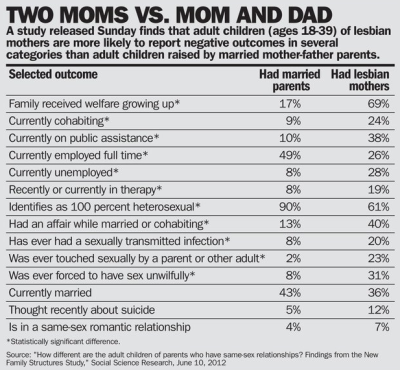
ECM pointed out to me that some more information about the two studies that were just published in the mainstream science journal Social Science Research appeared in National Review.
Excerpt:
The mainstream academic journal Social Science Research has just published two articles that expose and challenge the schlock social science on gay parenting that has been uncritically embraced and propagated by so many people eager to advance the cause of gay marriage.
In “Same-sex parenting and children’s outcomes: A closer examination of the American Psychological Association’s brief on lesbian and gay parenting,” LSU professor Loren Marks addresses a puzzle: On the one hand, studies based on “large, representative samples” have shown that “[c]hildren who grow up in a household with only one biological parent are worse off, on average, than children who grow up in a household with both of their biological parents.” On the other hand, “social science research with small convenience samples has repeatedly reported no significant differences between children from gay/lesbian households and heterosexual households.” (Pp. 735-736 (emphasis added).)
Marks’s essential answer to the puzzle is that the studies “with small convenience samples” are unreliable. Among other things:
1. “[S]ocial researchers examining same-sex parenting have repeatedly selected small, non-representative, homogeneous samples of privileged lesbian mothers to represent all same-sex parents.” (P. 739 (emphasis added).)
2. “[I]n selecting heterosexual comparison groups for their studies, many same-sex parenting researchers have not used marriage-based intact families as heterosexual representatives, but have instead used single mothers.” (P. 741 (emphasis added).) Despite the broad claims made on behalf of the research, “with rare exceptions, the research does not include studies comparing children raised by two-parent, same-sex couples with children raised by marriage-based, heterosexual couples. (P. 742.)
3. The American Psychological Association’s claim that “not a single study has found children of lesbian or gay parents to be disadvantaged” fails to take account of the largest study that actually examined “children’s developmental outcomes.” (Pp. 742-743.)
4. The same-sex parenting studies have failed to address a range of outcomes for children that are usually the focus of national studies on children, including drug and alcohol abuse, truancy, sexual activity, and criminality. (Pp. 743-744.)
These new studies contradict the politically correct pronouncements of the APA. But evidence came out last week that they are “controlled” the gay rights movement, according to a former President of the APA, who is himself pro-same-sex-marriage.
We should not be redefining marriage if it is going to hurt vulnerable children. I made the case before from the research that same-sex unions are not the same as heterosexual married couples. And now we have direct evidence that the differences matter to children.

My heart sank when I saw “Was ever touched sexually by a parent or other adult”
I’m about to steal the image, Wintery.
LikeLike
Thank you for bringing this to light W.K
LikeLike
“Two Moms vs Mom and Dad” is rather a misleading title. It implies that the study looked at the children of committed lesbian couples (in a civil union/marriage-like relationship) compared with the children of committed traditionally-married couples.
It did not. The criteria was simply that the grown children surveyed had one parent who had, at some point during their childhood, had a homosexual relationship. The children may or may not have lived with the homosexual parent during the relationship, and may have experienced a wide variety of family structures during that time.
In other words, a respondent could have lived with unhappily married parents (mother and father) for thirteen years, then gone through the divorce, after which the mother indulged in a one-night stand with a woman before marrying another man two years later… and that respondent would still be counted as the “child of a lesbian mother” for the purposes of the survey. And obviously in that kind of situation it would be difficult to single out the one-night lesbian stand as the cause of the child’s potential poor outcomes.
And indeed, the author of the study noted that many of the children did live in a wide variety of family structures; often several different family structures over the course of a childhood.
It’s certainly interesting data, but it’s not a direct comparison in the manner your headline and graph suggests. It can’t be used as an argument against lesbian marriage, because the study wasn’t looking at lesbian marriage-like parenting arrangements.
Or am I missing something? The data as presented in the graph wasn’t presented that way in the study itself, and I’m no statistician – did someone search through the data for the respondents who specifically reported living with “two moms” throughout childhood and use only that data to compile the graph?
LikeLike